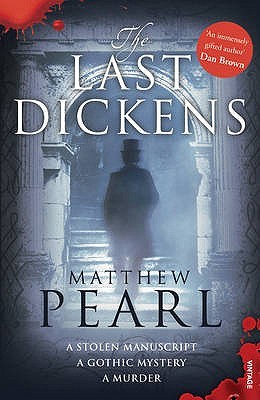Simona B's Reviews > The Last Dickens
The Last Dickens
by

by

3.5
“Looking around, it seemed every character from every Dickens novel, aristocrat and common, pompous and inconspicuous, had come to life...”
The Last Dickens by Matthew Pearl is an entertaining novel and a treat for Dickens fanatics such as myself. As much as I enjoyed myself, however, I think that I would have appreciated the book more if I hadn't already read and reread and loved The D. Case or The Truth About The Mystery Of Edwin Drood by Fruttero and Lucentini. The aims of these two works are not exactly one and the same, and as a result they unfold in two different directions in a beautiful parallelism, as one starts investigating the novel Drood and the other the manuscript Drood, and then they both proceed to cross and blur the boundaries between reality and fiction, and between fiction and criticism.
That book, now, The D. Case, is a real literary investigation that had me down on my knees in adoration; and I guess that the problem is that I expected once again something on that line. And truth be told, in part I got it: only a great scholar equipped with an exceptional and devoted imagination could think of spinning this story around Poe's Philosophy of Composition and make it believable, or at least not entirely absurd. Other plot devices I liked way less and found way less realistic, (view spoiler). The book also provided, under a thin fictional disguise, a lot of actual historical information on Dickens, the publishing industry, the opium trade and so forth, and for me that's only a bonus.
Long story short, I may not have loved the plot in itself, but pretty much everything else about The Last Dickens was a success for me. I could even be persuaded to raise my rating in the future, according to how the memory of the book will sediment. What is sure is that Matthew Pearl was able to inject new life in the deep fascination the Drood mystery (both fictional and real) holds for me.
“Looking around, it seemed every character from every Dickens novel, aristocrat and common, pompous and inconspicuous, had come to life...”
The Last Dickens by Matthew Pearl is an entertaining novel and a treat for Dickens fanatics such as myself. As much as I enjoyed myself, however, I think that I would have appreciated the book more if I hadn't already read and reread and loved The D. Case or The Truth About The Mystery Of Edwin Drood by Fruttero and Lucentini. The aims of these two works are not exactly one and the same, and as a result they unfold in two different directions in a beautiful parallelism, as one starts investigating the novel Drood and the other the manuscript Drood, and then they both proceed to cross and blur the boundaries between reality and fiction, and between fiction and criticism.
That book, now, The D. Case, is a real literary investigation that had me down on my knees in adoration; and I guess that the problem is that I expected once again something on that line. And truth be told, in part I got it: only a great scholar equipped with an exceptional and devoted imagination could think of spinning this story around Poe's Philosophy of Composition and make it believable, or at least not entirely absurd. Other plot devices I liked way less and found way less realistic, (view spoiler). The book also provided, under a thin fictional disguise, a lot of actual historical information on Dickens, the publishing industry, the opium trade and so forth, and for me that's only a bonus.
Long story short, I may not have loved the plot in itself, but pretty much everything else about The Last Dickens was a success for me. I could even be persuaded to raise my rating in the future, according to how the memory of the book will sediment. What is sure is that Matthew Pearl was able to inject new life in the deep fascination the Drood mystery (both fictional and real) holds for me.
Sign into Goodreads to see if any of your friends have read
The Last Dickens.
Sign In »
Reading Progress
January 12, 2018
–
Started Reading
January 16, 2018
– Shelved
January 16, 2018
– Shelved as:
in-english
January 16, 2018
– Shelved as:
historical
January 16, 2018
–
Finished Reading
March 12, 2020
– Shelved as:
2000-present


